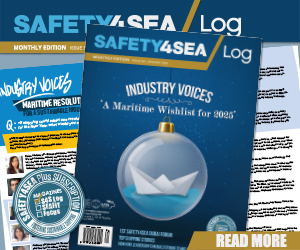In an exclusive interview to SAFETY4SEA, Jenny Braat, CEO, Danish Maritime highlights the importance of Europe maintaining its global market position. She advocates for a European maritime strategy to boost competitiveness and secure EU funding, with Danish Maritime engaging in discussions to position Denmark as a leader in green transformation and innovation.
Jenny Braat also stresses the need to fast-track green technologies and alternative fuels while encouraging the industry to adopt an outward mindset to attract young talent. Collaborating with schools and universities, she suggests, can showcase career opportunities and provide hands-on experience through internships and apprenticeships.
SAFETY4SEA: What is your organization’s philosophy for the industry’s energy transition and what are the top priorities on your agenda for the next five years?
Jenny Braat: At Danish Maritime, we promote Denmark as State of Blue Tech, as our companies play a significant role in developing and decarbonizing global shipping. Over the next five years, we will focus on promoting green solutions, ensuring supportive regulations, and attracting skilled talent. Our emphasis on sustainability and innovation aims to position Denmark’s maritime industry as one of the leading countries regarding green transformation and technological advancement.
S4S: Can you discuss any recent developments or advancements of your organization that have particularly impacted the maritime industry?
J.Br.: Danish Maritime has strongly underlined the need for a European maritime industry strategy by working with SEA Europe in the dialogue with the European parliament. Together we propose a strategy to improve Europe’s maritime competitiveness through targeted research and development investments and better access to EU funding. We also highlight the importance of channelling green taxes into innovation, refining public procurement criteria, and supporting European maritime production. This is vital to sustain Europe’s position on the global market and I am very pleased that the EU has met our requirements positively and is now working on a maritime industry strategy.
S4S: What are some of the most significant challenges that the maritime industry faces in achieving its decarbonization goals? What are your suggestions to turn these into opportunities?
J.Br.: An obvious challenge is the high cost and limited availability of alternative fuels, so while we develop new technologies for the green transition the politicians have quite a large challenge to ensure the amount of renewable energy needed. Another essential thing is energy efficiency needed both to lower the consumption of fuel and also with a large export potential as global shipping cannot meet the climate goals without both new fuels and better energy efficiency. So, technology is key, and improvements never stop.
S4S: What can the industry do to help engage the maritime workforce who feel like they may not have a voice in the energy transition?
J.Br.: The maritime industry is nothing without our employees and it is our responsibility to make sure that they both choose us in the first place and stay. As a business organization we work for relevant education and lifelong learning at all levels, thereby ensuring that the workforce is up to date and gets involved when new technologies and work methods are introduced. Also, innovation is key and that very often comes from a creative employee with a boss who understands how to listen.
S4S: What needs to be considered in order to keep pace with the emerging technologies and maintain a balance between safety and innovation?
J.Br.: The maritime industry is highly engaged in safety at sea, both regarding safety equipment and when looking at the ship in general e.g. introducing new fuels such as ammonia. Companies in the industry develop technologies and solutions with much regard for safety and products are thoroughly tested before implementation. What is very important is the authorities are also up to speed and work closely together with the industry. In our experience new technology often awaits the needed permission and that is not ideal.
S4S: What actions should we take to collectively create an inclusive and attractive industry and improve the industry’s image for the younger generation?
J.Br.: In my opinion it’s not so much about the image but more about the lack of knowledge. They simply know too little about our very exiting technological development and great career opportunities. So, we need to promote that more and because the technical subjects typically attract a higher number of men than women, we also have a focus on diversity and put a large effort into partnerships with schools and universities providing information and hands-on experience via internships, apprenticeships and other initiatives.
S4S: How can industry stakeholders best collaborate in support of sustainable development to witness real progress towards industry’s goals?
J.Br.: First of all we need to test the new solutions together and also take some chances together so the first movers do not carry the risk alone. Secondly the industry and the regulators and research institutions can work more strategically together. Thirdly: the higher demands the faster the speed. Initiatives like the Waterborne Technology Platform, where we work with visions and strategic agendas for the sector, are very important, but all experience shows that regulation is the major driver and course that needs to be global and, in my opinion, even more ambitious.
S4S: Do you believe the maritime industry is moving in the right direction? What do you see as the defining sustainability trends driving maritime toward the future?
J.Br.: Yes, I do. The industry is progressing through decarbonization, adoption of green technologies, and collaboration across sectors. Focus on alternative fuels, energy-saving innovations, and circular economy practices demonstrates its commitment to sustainability and our way to a sustainable, low-emission future.
S4S: If you could change one thing across the industry from your perspective, what would it be and why?
J.Br.: It would be to accelerate the adoption of green technologies and alternative fuels on a global scale. The maritime industry has made significant strides, but there is still a considerable gap between the technologies available and their widespread implementation.
S4S: What is your key message to industry stakeholders to foster a more sustainable future for shipping?
J.Br.: The maritime industry must come together to accelerate the adoption of green, energy efficient technologies. By working together, we can create a strong, sustainable maritime ecosystem that not only meets decarbonization goals but also positions the industry as a leader in global sustainability efforts.
The views presented are only those of the authors and do not necessarily reflect those of SAFETY4SEA and are for information sharing and discussion purposes only.
































































